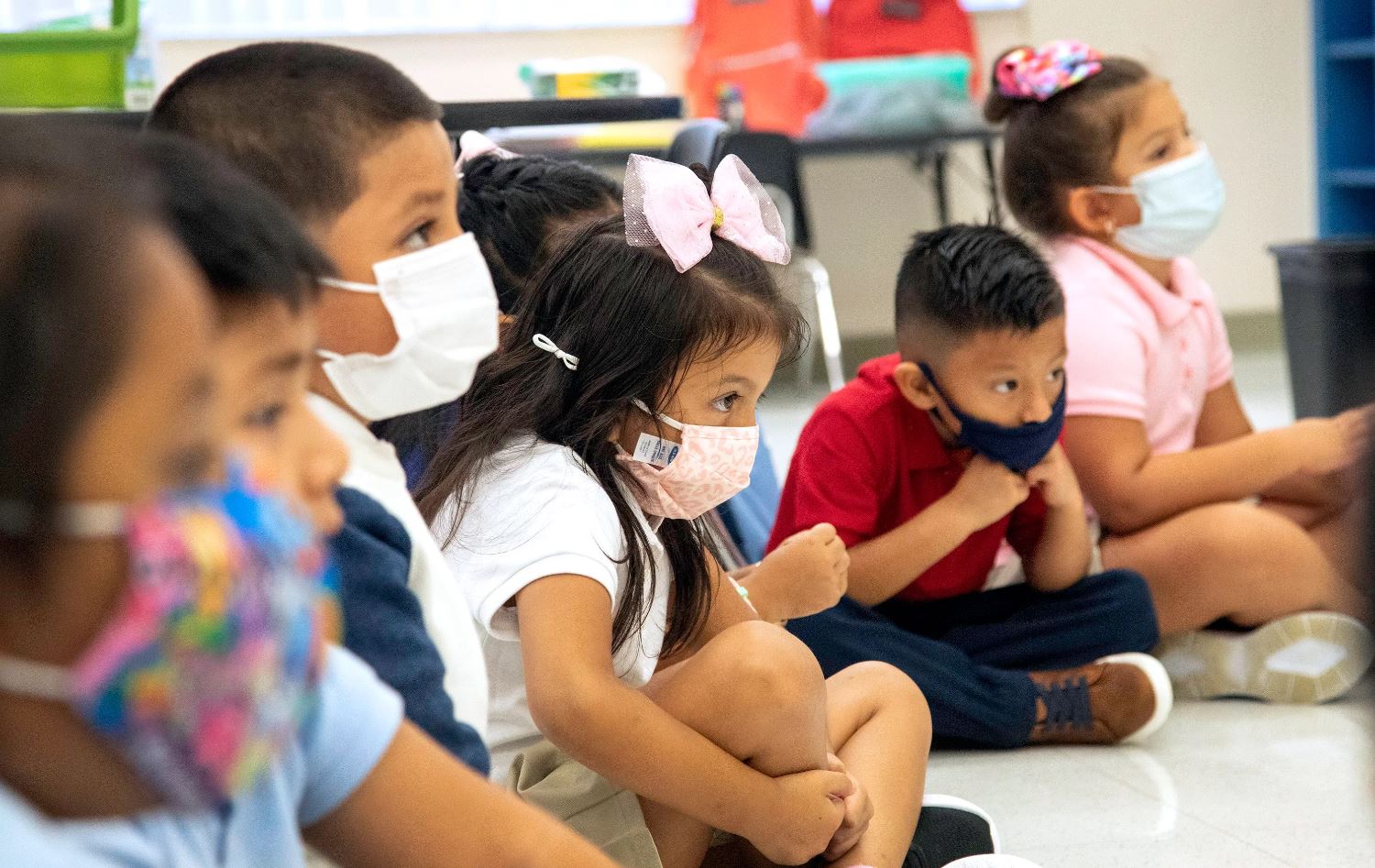By Craig Schneider, Published in Newsday, August 20, 2024
Roosevelt kindergarten teacher Margarita Acevedo said she’ll be starting the new school year with excitement, anticipation — and concern.
The teacher said that since children returned from the pandemic in fall 2021, some have lacked basic abilities, including how to handle pencils and crayons, as well as social skills such as getting along with others, taking turns and listening to one another.
“I feel like I’m starting off the year needing to do urgent interventions,” said Acevedo, who teaches at Ulysses Byas Elementary School.
She is hardly alone in such worries. Long Island educators and child experts say some of the youngest students — who were babies, toddlers and in prekindergarten when COVID reached the United States in 2019 — are struggling with relating to other students, throwing tantrums in class and not wanting to go to school.
WHAT TO KNOW
- Some of Long Island’s youngest public school students — who were babies, toddlers and in prekindergarten during the COVID pandemic — are struggling with relating to other students, throwing tantrums in class and not wanting to go to school.
- These students, now in kindergarten through third grade, missed important social interactions with their peers and others during the year or more of lockdowns and remote learning.
- Island educators say they are optimistic the children can catch up, given the school-based interventions and kids’ natural resiliency.
“We’re seeing an increase in these children with social deficits — navigating a social setting, navigating conflict and sharing things,” said Antonio Santana, superintendent of the South Country school district in Suffolk County. “More young kids need counseling. … It’s enough that it’s notice.”
The pandemic impacted students across all ages, setting many back academically and developmentally. Many were largely left at home to their own devices without much supervision or time with friends. Now, educators are seeing the effects it had on younger children.
These students, now in kindergarten through third grade, missed important social interactions with peers during the year or more of lockdowns, educators say. They lost out on structured learning when day care centers and preschool programs shut down in March 2020, educators and local child therapists said.
“We have noticed that many students entering kindergarten are not at the developmental and academic level we would typically expect,” said Shawn Wightman, superintendent of the Roosevelt school system. “Issues such as difficulties in fine motor skills, limited verbal communication, and challenges in emotional regulation have become more pronounced.”
Nakia Wolfe, a math intervention instructor in the Amityville district, taught grades 3-5 after the pandemic. He said he saw the difference as soon as the children came into class.
“Especially in terms of stamina, their ability to focus,” Wolfe said. “There were more behavior issues, more fighting.”
Helping kids readjust academically was difficult enough when many students returned to classes full time in 2021, he said. But dealing with the added social and emotional difficulties “felt like you were climbing up a steep hill and now were pushing a boulder.”
Island educators say they’re addressing the challenges. Children’s mental health already had become a major concern before the pandemic, and COVID added to those worries. Educators have been using millions in federal aid to hire more school counselors and implement more interventions.
South Country added a counselor at the elementary level in the 2023-24 school year and is considering adding another for its youngest students, Santana said.
“We’re continuing our focus on character education, so we actually do look out for one another,” he said.
More younger children need counseling, said Antonio Santana, superintendent of the South Country school district. Credit: Alejandra Villa Loarca
Roosevelt spent about $200,000 to add a speech specialist and an occupational therapist during the pandemic to address the developmental delays in these students, Wightman said.
The district also has hired three additional social workers, at a cost of about $495,000, since the pandemic to ensure every building has social workers and counselors, he said.
Roosevelt also hired three reading specialists and three math specialists during the pandemic, at a cost of $625,000, to work with the students, he said.
In addition, Roosevelt’s after-school and summer tutoring programs have helped to close academic gaps, Wightman said, adding that these programs cost a total of about $1.2 million. Those costs cover a range of initiatives, including those that started in the summer of 2021 to target young learners with foundational literacy and math tutoring, he said.
The superintendent said assessments indicate a 14% increase in reading fluency among K-3 students since 2021.
In Port Jefferson, school officials said that at the elementary level, speech teachers and counselors are providing “push-in” services in which they come into a class to provide lessons in social skills and language skills, said Jodi Cahill, district director of special education.
“Many teachers are doing a social-emotional check-in at the start of a class, asking students, ‘Feel OK today?’ ” she said. “It’s become ingrained in a lot of our teachers.”
COVID money ending this school year
Worries persist, however.
COVID money is drying up this coming academic year. That and other budget cuts have forced some schools to cut back and even lay off some counselors and social workers, said Stacy Pellettieri, clinical director of Long Island Counseling, which has offices in East Meadow and Melville.
“Some schools don’t have the resources, and they’re overwhelmed,” said Pellettieri, who works with about 30 Island districts. “This is the worst possible time to get rid of school social workers.”
Wightman said Roosevelt is keenly aware of the financial challenges that will arise when COVID money runs dry. He said the district is pursuing additional grants and other funding to sustain the additional positions.
“However, if we are unable to secure the necessary funding, we will be faced with difficult decisions that could involve reductions in services and/or programs, leading to potential budget cuts and staffing reductions,” he said.
The majority of Island districts, including Roosevelt, begin school Sept. 3.
Over the past year, Amityville has let go of a half-dozen social workers, leaving the district with about five, Wolfe said. The Sachem district also has laid off social workers in that period.
Following the pandemic, Riverhead added several social workers, psychologists and guidance counselors, interim Superintendent Cheryl Pedisich said. This past school year, due to budget constraints, the district reduced one psychologist, one social worker, and 0.4 guidance counselor, Pedisich said.
Pellettieri said she is seeing roughly a 30% to 40% increase in young students with emotional problems coming in for help. She said some teachers are reacting to these children acting out with punishments that don’t get to the heart of the problem.
“It’s really important not to shame them. … It’s almost like punishing a disability,” Pellettieri said.
Stacy Pellettieri, clinical director of Long Island Counseling, said she is seeing more young students with emotional problems coming in for help. Credit: Rick Kopstein
Teachers and parents need to help the child feel safe in school and catch up on the skills they need, she said. The child may need some counseling or to come to class in shorter periods until they become comfortable with the school setting.
Cahill said the Port Jefferson district is using “trauma-informed” responses to young students acting out, rather than just simple discipline.
“We’re looking at how do we work with a student, and understand what they’re going through, rather than just punishment,” she said.
Before the pandemic, it was not uncommon to see some nervous kids on the first day of school clinging to their parents outside. But now, for some kids, that separation anxiety has grown into refusing to go to school at all, Pellettieri said.
“Certain stages of development require experiences. … The pandemic interrupted those experiences and interactions,” Pellettieri said.
Playing with other kids teaches them to take turns, share and resolve conflicts, she said.
“Both parents had to work from home, and day cares and preschools were all closed, leaving parents no choice but to use the television or iPads to keep the kids busy,” she said.
Much depends on how parents themselves handled the pandemic, said Susan Cohen, clinical director of the Right From the Start program at the North Shore Child & Family Guidance Center in Manhasset. Even the youngest of children pick up on their parents’ stress, she said.
“The anxiety trickles down. They may not know about the pandemic, but they see that the anxiety is amped up,” Cohen said. At the same time, she said, some children are simply more prone to anxiety regardless of their parents’ behavior.
The stakes are high in helping these children, she said.
“It’s in second and third grade when learning disabilities often show up. That’s when children go from learning how to read to reading to know other subjects,” Cohen said. “If they’re not succeeding, they can fall behind. Their self-esteem takes a hit.”
That can lead to more absenteeism and resistance to even go to school, she said.
“They don’t want to be put in an environment where they’re not succeeding,” she said.
1.3M behind in reading, 1.7M in math
The issue stretches well beyond Long Island.
While studies show older students have shown encouraging signs of recovery in math and English, younger students who were not in a formal school setting when the pandemic hit have not fared as well, and some are falling further behind, according to a 2024 report by Curriculum Associates, a Massachusetts company that provides math and reading tests for students.
If applied nationally, the report suggests that 1.3 million second-graders are behind in reading, and 1.7 million are behind in math.
Addressing students in K-3, the report concluded, “We found these students are performing behind pre-pandemic levels, with limited signs of recovery.”
The report notes that the pandemic’s impact on older children has been studied extensively, but little research has focused on the youngest children.
“I think this data, based on millions of students across the nation, is a call to action across the education community,” said Kristen Huff, the company’s vice president of assessment and research, noting it could take years for these young learners to rebound.
However schools respond to this trend, it’s critical that they involve parents, educators and therapists.
In Roosevelt, school officials have made a point of working more closely with parents, Wightman said. The district launched family engagement programs in the fall of 2022, at a cost of $80,000, that include training sessions on positive parenting techniques and tools for managing stress, he said.
“Despite the challenges, we remain optimistic about our students’ ability to catch up,” he said. “Young children possess remarkable resilience and adaptability. . . . Many of our students are demonstrating significant improvements in literacy and numeracy skills, and we are witnessing enhanced social interactions.”
Acevedo, the Roosevelt kindergarten teacher, said she’s heading into the school year with more hope than worry. She’s been focusing on positive reinforcement with the kids.
“When I see a child crawling around on the floor, I look at the child who’s behaving and say, ‘I love the way you’re sitting in your seat,’ ” she said. “The child on the floor sees the praise, and they’re going to want that praise.”
TIPS FOR PARENTS
Susan Cohen, clinical director of the Right From the Start program at North Shore Child & Family Guidance, offers these tips to parents for helping children with emotional problems:
- Be open to listening to the child.
- Help the child express their feelings.
- Try not to project your own anxiety onto the child.
- Don’t be afraid to ask for help.
- The child needs to understand there are consequences for their actions, but also work on understanding what’s behind the behavior and work on better ways to handle it.
- Always try to communicate with the child’s school.
Click to read the article, Younger students are developmentally behind, educators say, and they’re blaming the pandemic – Newsday
















